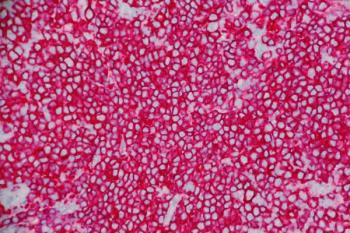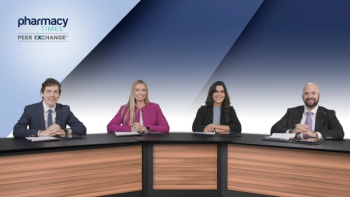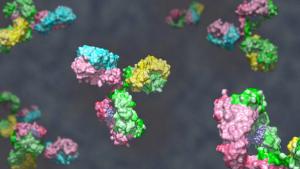
New findings on myelofibrosis treatments reveal the impact of anemia on survival and the benefits of momelotinib for transfusion independence.

New findings on myelofibrosis treatments reveal the impact of anemia on survival and the benefits of momelotinib for transfusion independence.

Pharmacists play a crucial role in managing myelofibrosis treatment, ensuring patient education, medication access, and monitoring for adverse effects.

Experts discuss the need for improved clinical trials in myelofibrosis, focusing on disease modification, patient outcomes, and potential new therapies.

Explore how real-world evidence shapes myelofibrosis treatment, focusing on biomarker utilization and safety profiles of JAK inhibitors.

Explore the latest advancements in myelofibrosis treatments, including Fedratinib, Pacritinib, and Momelotinib, and their clinical impacts.

The epcoritamab, rituximab, and lenalidomide regimen provides a chemo-free, outpatient option for relapsed or refractory follicular lymphoma (FL), offering high response rates, improved quality of life, and expanding pharmacists’ roles in patient management.

Zahra Mahmoudjafari explains how the epcoritamab, rituximab, and lenalidomide regimen delivers durable responses in relapsed or refractory follicular lymphoma while expanding the pharmacist’s role in dosing coordination and toxicity management.

Zahra Mahmoudjafari, PharmD, MBA, BCOP, FHOPA, explains how the epcoritamab, rituximab, and lenalidomide regimen delivers durable responses in relapsed or refractory follicular lymphoma while expanding the pharmacist’s role in dosing coordination and toxicity management.

Explore the latest advancements in JAK inhibitors for myelofibrosis, highlighting their unique mechanisms and clinical implications for patient care.

Explore the evolution of myelofibrosis treatments, from traditional therapies to groundbreaking JAK inhibitors, and the ongoing need for innovative solutions.

Zahra Mahmoudjafari, PharmD, MBA, BCOP, FHOPA, highlights the EPCORE FL-1 trial, which showed that adding epcoritamab to rituximab and lenalidomide improved response rates and reduced progression risk in patients with relapsed or refractory follicular lymphoma.

Explore the long-term effects of myelofibrosis and the importance of early diagnosis and treatment for better patient outcomes.

Explore the critical role of patient characteristics and biomarker testing in managing myelofibrosis, enhancing prognosis and treatment strategies.

Oncology pharmacists discuss myelofibrosis management, focusing on anemia, JAK inhibitors, and improving patient outcomes through tailored care.

Explore expert insights on managing myelofibrosis, focusing on anemia, JAK inhibitors, and enhancing patient care for better outcomes.

Oncology pharmacy evolves rapidly, emphasizing the need for pharmacists to stay informed and reflect on personal growth for better patient care.


August marks a pivotal time for oncology pharmacy, blending transitions, celebrations, and new beginnings as professionals prepare for the upcoming season.

Panelists discuss how advancing chronic graft-vs-host disease (cGVHD) management involves improving steroid response rates, exploring combination therapies, utilizing biomarkers for personalized treatment, and striving for steroid-free first-line options to enhance patient outcomes and reduce long-term adverse effects.

Panelists discuss how collaboration between pharmacists and health care providers is essential for optimizing treatment outcomes in chronic graft-vs-host disease (cGVHD), emphasizing the importance of education, symptom management, and a multidisciplinary approach to ensure comprehensive, patient-tailored care.


Zahra Mahmoudjafari, PharmD, MBA, BCOP, FHOPA, co-chair of the 2025 Oncology Pharmacists Connect (OPC) meeting, discusses what makes the event unique, highlights key sessions, and shares her excitement for the educational and networking opportunities.

Panelists discuss how pharmacists improve patient outcomes in chronic graft-vs-host disease (cGVHD) by addressing accessibility and tolerability challenges, optimizing drug regimens, managing adherence, and fostering trust with patients to ensure consistent therapy and long-term success.

Panelists discuss how pharmacists are essential in managing chronic graft-vs-host disease (cGVHD) by addressing challenges like toxicity, financial and logistical barriers, and a lack of awareness, while advocating for patient education, collaboration with health care teams, and ensuring access to necessary therapies.

Panelists discuss how evolving treatment pathways at Emory Healthcare, including earlier use of emerging therapies and off-label combination treatments, are shaping the management of chronic graft-vs-host disease (cGVHD), with an emphasis on personalizing therapy based on real-world data and patient-specific factors.

Panelists discuss how factors such as patient preferences, disease severity, organ-specific involvement, and adverse effect profiles influence the selection of second-line therapies for steroid-refractory chronic graft-vs-host disease (cGVHD) in the context of multiple FDA-approved agents.

Panelists discuss how factors such as patient preferences, disease severity, organ-specific involvement, and adverse effect profiles influence the selection of second-line therapies for steroid-refractory chronic graft-vs-host disease (cGVHD) in the context of multiple FDA-approved agents.

Panelists discuss how recent FDA approvals and evolving evidence for second-line treatments, including ruxolitinib, ibrutinib, and belumosudil, are reshaping chronic graft-vs-host disease (cGVHD) management by offering tailored, evidence-based options for steroid-refractory patients.

Panelists discuss how second-line therapy selection and individualized care strategies are essential in chronic graft-vs-host disease (cGVHD) management, emphasizing the need to reduce steroid-related toxicity, address patient-specific factors, and leverage pharmacist expertise to optimize outcomes.

Panelists discuss how early diagnosis, evolving treatment strategies, and pharmacist-led interventions are advancing chronic graft-vs-host disease (cGVHD) management by addressing unmet needs, improving care coordination, and enhancing patient access to emerging therapies.

Published: May 30th 2025 | Updated: June 5th 2025

Published: October 15th 2024 | Updated:

Published: June 13th 2025 | Updated: June 5th 2025

Published: June 20th 2025 | Updated:

Published: June 13th 2025 | Updated: June 5th 2025

Published: November 7th 2025 | Updated: